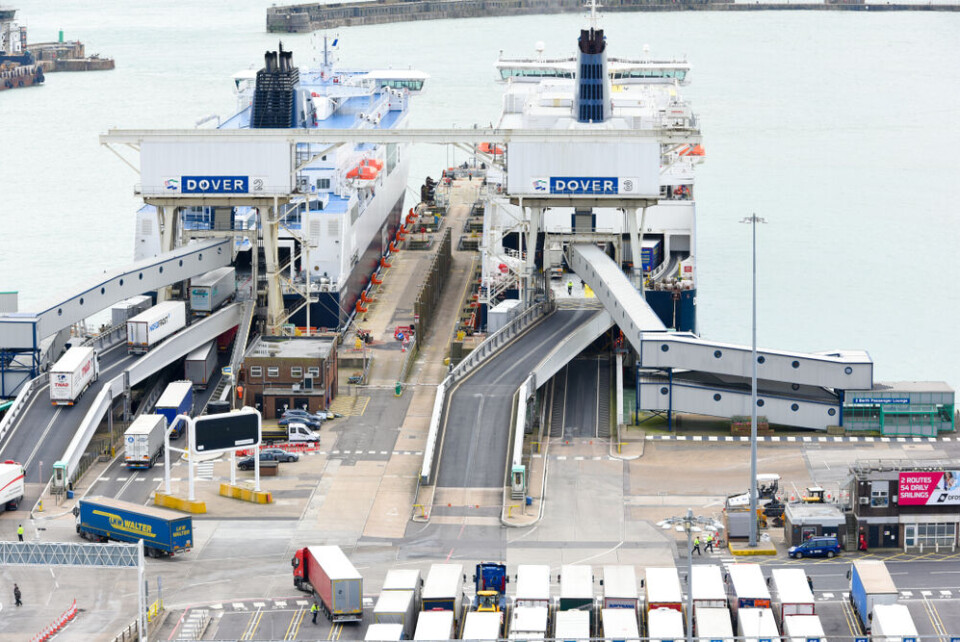-
Shop donations: Pays de la Loire and Corsica are France’s most generous regions
Almost €15 million was raised in 2025 via ‘round up’ donations at checkouts
-
Train passengers in Occitanie to be reimbursed over frequent delays and cancellations
See eligibility conditions and find out how refunds will be issued
-
Marine Le Pen appeal: Prosecutors call for election ban to be upheld
The court of appeal will return a decision before the summer, ahead of the 2027 elections
Dover Port boss warns of safety issues and delays with new EU checks
Ferry passengers will need to get out of their cars for the capturing of biometric data, which has to be done at the point of departure and is due to start this autumn

The Port of Dover has reiterated warnings that there could be major delays when the EU’s Entry-Exit System (EES) comes into force this autumn as it is still lacking practical solutions for the infrastructure and processes to cope with the changes.
Read more:Logistical concerns over EU Entry/Exit System due to start in autumn
What is EES?
The EU is scheduled to begin implementing EES from the end of September or the beginning of October. The system will involve the collection of information about non-EU citizens entering the Schengen area and is intended to eventually remove the need for passport stamps.
The EES will record people’s name, type of travel document, biometric data (fingerprints and facial images), date and place of entry and exit at the border, automatically calculating the amount of time they are permitted to stay in the Schengen area.
It may be possible for machines to carry out some parts of these checks – including the capturing of biometric data – but passengers will also be required to pass before border police, and operators are concerned that this could double processing times.
From early 2023, non-EU travellers will also have to apply online for travel authorisation under ‘Etias’ (European Travel Information and Authorisation System) before travelling.
Application details will be checked against EU data systems, and up to 95% of applications are expected to be approved within minutes. However, if further checks are required, the process could take up to 30 days.
These procedures will concern travellers to the Schengen area from non-EU/EEA/Swiss countries who either hold a short-stay visa or who are exempt from short-stay visa requirements. This will include Britons, Americans and Australians.
Foreign residents of France (eg. holding long-stay visas and/or residency cards or Brexit Withdrawal Agreement residency status) will not need to gain Etias authorisation or go through the EES system prior to travel, but will need to bring proof of their residency with them when they travel, along with their passport.
Why will this cause delays at Dover?
The biometric checks involved in the EES system will require people boarding ferries at Dover and other ports to leave their cars, and the Port of Dover’s Head of EU Exit, Tim Reardon, has expressed concerns about the potential for this to cause disruption, both in terms of safety and traffic flow.
Mr Reardon told The Connexion: “The e-gates [and similar machines] which make biometric checks possible for pedestrians at airports or railway stations just do not exist at a ferry terminal, or indeed at the motorway crossing points at the eastern frontier of the European Union.
“We cannot get people out of their vehicles [for the checks], because that is a safety risk, as there is traffic moving around.
“EES is a system owned, designed, built and operated by the French border police [who carry out EU entry checks at Dover], so the responsibility sits with them. We at the Port of Dover have a very keen interest because our interest is in the safety of everybody passing through our site.
Mr Reardon added that the port is concerned that the biometric checks system would prevent traffic from flowing through “at the rate at which it currently travels.
“In other words, if we get 300 cars passing through the port in an hour, then the system has to be able to process them.
“The French border police understand entirely the issues surrounding keeping up with the rate of flow and around people getting out of cars, which is why they are looking at a tablet solution.
“The tablet would be handed through a car window and everyone inside would record their data on it. But that is a concept, not a functioning process,” he added, stressing that it is not known whether it would work quickly enough to keep up with the flow of traffic. “It might be a dead end.
Mr Reardon added that, for the port: “The challenge is the stipulation written into European law that everything has to be done at the border.
“They've loaded the full weight of the process onto the point where traffic is least able to cope with it.
“The answer in our view is modifying the process so that the thing that really takes time – capturing everybody’s biometric data and putting it on the system – ought to be moved away from the border and done before travel.
“[This would be] in the same way that if you are making an international journey, you buy a ticket, you might get a vaccination, you change some money; all these things you do at home or close to home. You do not leave it until you reach the frontier.
Mr Reardon had previously told The Telegraph: “We've been trying to engage the UK government in this looming risk for a good couple of years now. They have become more interested in the last two or three months.
He told The Connexion that: “The UK government has been having meetings with us and their French counterparts, but there is not a defined process yet, let alone one that works.
“Before you can start doing something you need to know what the thing is. The timetable will necessarily depend on how long it takes to build a process and a system. At the moment we haven’t got to square one.
“Everybody is in a bind trying to bring into reality a piece of law which was written for a different context.”
Some 3.1 million people passed through the Port of Dover – the UK’s busiest passenger port – in 2021, along with more than 2.1 million lorries.
Do other travel operators feel ready for the new system?
John Keefe, spokesperson for Getlink, which manages Eurotunnel, told us: “Eurotunnel is working closely with the border authorities to ensure that it can be activated with the least possible impact on passenger travel”.
He also predicted that the system may be delayed beyond September as international terminals struggle to put the relevant infrastructure in place, and instead “expected [it] to become operational in 2023.”
Nicolas Paulissen, who is executive officer of the Union des Aéroports français, which represents 156 French airports, also expressed concerns over the new system.
“France, like many EU countries, is very behind with regards to the implementation of EES. At the moment, French airports are trialling pre-registration kiosks, which may be installed to facilitate movement through to border control,” he told The Connexion.
“The problem with EES is that it is going to increase waiting times, so it is hoped that these booths will save some time.
“Certain procedures, such as taking a person’s photo as they enter the EU, can be carried out in the kiosks. [However] they are not e-gates because you still have to then go to the manned border control desks.
“But even with these kiosks, waiting times at airports – which are already significant – will increase, unfortunately,” he added.
“When we talk about waiting times, we think about the time it takes to process each ‘unit’, that is to say: the time that the border officers take to process one passenger.
“That time is going to be multiplied by two at least, three in some cases. So when you have 200 passengers disembarking from the plane the wait is going to be significant.
“In addition, not all airports will have kiosks. British people, for example, are going to small French airports won’t see kiosks,” although there may be more staff deployed to process people.
“So we are still very worried. It is going to be difficult.
“However, we are happy that this is coming after summer, because the system was originally supposed to come into effect in May. We were definitely not ready then, we have not even trialled the kiosks in a real-life scenario yet.”
Mr Paulissen added that the EU had not offered French airports any practical help with the implementation of EES. “We have the reglementary texts and it is up to member states to implement them,” he said.
Mr Paulissen also suggested that the system would not be operational by its planned “start date of October 1.
“There are currently discussions underway about pushing it back to the end of November,” he said, but added that nothing has been agreed for definite.
“No one is ahead of schedule with this project, so it begs the question whether it is realistic to expect that we will get the system ready between now and the end of the year. But we don’t know.”
A spokesperson for the European Commission told The Connexion: “The Commission will decide the start date [for EES] once all member states and EU organisations have declared that they are ready.
“This is currently planned for autumn 2022."
She added: “Member states are directly responsible for border controls,” including the implementation of new infrastructures and systems.
“The Commission is encouraging member states to cooperate closely with airport and port operators in order to prepare the Entry/Exit System’s entry into service.
“At the same time, the Commission is also in contact with operators and is following the situation very closely. The Commission is constantly helping member states to find potential solutions.
“It cannot be avoided that certain delays will occur, especially at the beginning.”
Related articles
EU’s new entry and exit systems problematic, say UK travel chiefs
Etias: What is new EU €7 entry process and how might it affect you?
How can the EU’s proposed Etias and EES systems not be Brexit revenge?
























